wimpel69
02-08-2013, 02:29 PM
"This set surely takes up a distinguished position in the recordings of this great
twentieth century figure’s music. It is a superb musical and technical collaboration,
and one which I know I shall return to again and again with the deepest pleasure."
A must for the serious film music fan (especially lovers of good, pre-Zimmer-era film music!).
Not only was Sergei Prokofiev an outstanding film composer himself (Alexander Nevsky, Ivan the Terrible). His symphonic
oeuvre and his ballets have provided ample "inspiration" to other composers, notably the Hollywood ones, for the past
four decades. Fans of John Williams e.g. should focus on Symphonies Nos. 5 (final movement!) and 6 in particular. ;)
Dmitri Kita(j)enko made a superb, award-winning Shostakovich cycle with the Cologne-based G�rzenich-Orchestra
(the orchestra of the Cologne Municipal Opera) in the mid-2000s, and this complete cycle of Prokofiev symphonies, including
both versions of the 4th Symphony, is similarly successful. Don't miss out on this great music!
Enjoy! Don't share! Buy the original! :)
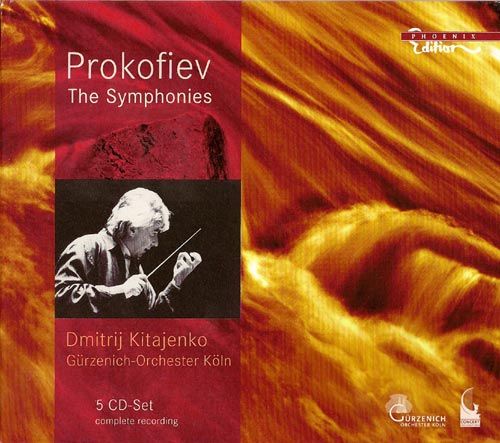
Music Composed by Sergei Prokofiev
Played by the G�rzenich-Orchester Cologne Philharmonic
Conducted by Dmitri Kita(j)enko
"Until Gergiev’s set of live performances with the LSO appeared, the Prokofiev symphonies as a series had been
nowhere near as well represented on disc as, say, those of Shostakovich or Sibelius. Now we have another
fine set, by an equally distinguished Russian conductor, Dimitrij Kitajenko. Perhaps the most interesting thing
about these performances is how different they are from Gergiev’s. Those readings are passionate, intense
and angst-laden where appropriate; there is no shortage of those qualities in Kitajenko, but his readings are,
on the whole, more measured, slightly more objective. Thus though the temperature may sometimes be a
degree or two lower than in Gergiev, there can be a stronger sense of the architecture of individual works.
The recordings, too, generally allow details of scoring to register with even greater clarity.
Annoyingly, there is a lack of precise information about recording circumstances; the third, fifth and sixth
are takes of live concerts in the Philharmonie Cologne, but the exact dates and venues of the other
performances are not given. The consistent overall balance and quality of sound, however, make it probable
that all were made in the Philharmonie. The G�rzenich Orchestra of Cologne has a proud and distinguished
pedigree which can be traced back as far as the 15th century. On the evidence of these discs alone, it is
a very fine outfit today. Individual parts are always played with character and the right degree of
expressivity, while the general ensemble in these sometimes frighteningly demanding scores is always
tight and controlled.
So a wonderful opportunity presents itself to update one’s evaluation of Prokofiev as a symphonist. The
1st, 5th and 6th symphonies have a secure place in the repertoire; but the 2nd, 3rd and 4th are much
rarer – indeed they are still virtually unknown to the average music-lover, which is extraordinary considering
the eminence of their composer. I confess that I was bowled over by the power of Prokofiev’s imagination
and of his creative personality as revealed by Kitajenko and his players. The 3rd Symphony in particular –
composed in 1928, and based on music from the opera The Fiery Angel – is a truly stunning work which
deserves far more frequent hearings.
The first disc, or ‘volume’, contains the 1st and 7th symphonies. A coupling of some sort is necessary as
the “Classical” is a mere 14 minutes or so, and placing it side by side with the 7th makes a lot of sense.
After that, the symphonies run in sequence, with the two versions of the 4th – the original of 1930 and
the revised version of 1947 – side by side on Volume 3. At present, the five discs are not available
separately, but it is to be hoped that eventually they will become so.
Kitajenko’s Classical Symphony makes a sparkling aperitif to the whole set. One general point to be noted
early on is that his tempi tend to be on the slow side of what we often hear; this is no bad thing, meaning
for example that the finale of the Classical fizzes delightfully without pushing the players too close to the
edge of the possible (as happens in Gergiev’s reading). I did wonder at the beginning of the Larghetto if
this was too much of a good thing, for the music seemed to ‘plod’. I soon got over that, and fell in with the
conductor’s relaxed approach, relishing the utter precision of the high violins and the subtle pointing of
accents in woodwind and horns. The Gavotte, too, is beautifully done, with a throw-away ending that
leaves you straining to hear the last two notes – don’t worry, though, they are there!
The 7th, continuing on the same disc, is naturally quite a different kettle of fish. Written at the very end of
the composer’s life, it is a strange work; it has none of the aggression of his early music, or even of its
immediate predecessor, the 6th . This owing to Prokofiev’s fragile health and to the political trouble he
had got into with the 6th. It has, on the other hand, many of the hallmarks of Prokofiev’s mature style –
great, broad melodies, brilliant orchestration, wit and fantasy. Indeed the first movement’s second theme
is one of the composer’s most magnificent, ranging through more than two octaves in just a few bars.
Yet when this heroic statement reappears in the coda of the finale, there is no sense of true symphonic
peroration; it almost seems as if the melody reappears for no better reason than, well, it’s a good one and
Prokofiev thinks we might like to hear it again. OK, I exaggerate, and the quiet conclusion that follows is
admittedly haunting and equivocal, but the symphony doesn’t grapple with great issues as do the others
from the second onwards.
That said, the 7th is full of charming and irresistibly melodious music, which Kitajenko explores with
subtlety and style, though his predilection for slower tempi does disappoint in places – the first movement
needs to get moving in its more agitato passages, and the opening of the Waltz is too drowsy here for my
taste too, though it does wake up later on. This is probably the least convincing of the conductor’s
interpretations, though, in fairness, the work itself is somewhat recalcitrant.
No such reservations with Volume 2, in which we come face to face with the Prokofiev of the 1920s: a
wild, iconoclastic figure, who was struggling both to find his own voice and to give vent to the tensions
he felt within himself. These were his years of self-imposed exile from the Soviet Union, and the music of
this time undoubtedly shows a huge range of influences. The 2nd Symphony of 1925 has a strange two-
movement structure; a lengthy first movement followed by a 25-minute set of variations. The opening
Allegro ben articulato is breathless, panicky, with motoric ostinati which remind one sometimes of the
Rite of Spring, sometimes of Honegger’s Pacific 231 – both works that Prokofiev encountered at this
time in his career. The gently Dorian theme of the second movement comes as a relief – to the nerves
and the ear – after the excesses of the Allegro. The variations are unfailingly inventive, and culminate
in a remarkable final variation, which begins as a bizarre funeral march, with a Mahlerian feel.
The first performance of the Second was a disappointment, not only to musicians and audiences, but
more importantly to the composer himself, who in his contemporary writings is to be found – for the
first and probably only time in his creative life – doubting his own creative talent. He should not have
worried; the first movement, however, does have a feeling of ‘trying too hard’, though fortunately,
in the Variations, the stress is relieved by Prokofiev’s characteristic humour and imagination.
It seems that in the 3rd Symphony Prokofiev truly found his way forward, and this to me was the big
discovery of this set, for it was not a work I had previously thought much of. How wrong I was,
because this is a genuine masterpiece of the highest order. Right from the churning major/minor repetitions
of the opening, we are drawn into an immense symphonic drama, with episodes of widely disparate
character, which are yet held together by powerful creative control. I was struck by an astonishing
passage in the first movement, Moderato, (track 9, 8:25 to 13:00); the main theme, a fine, broad melody
typical of Prokofiev, soars on high, while down below, heavy brass and percussion seem intent on
destroying its supremacy. And indeed, after some massive organ-like chords, the music collapses into a
grotesque military march - more Mahlerian memories - which in turn is succeeded by a moment of intense
poetry, where the piccolo quietly takes up the broad theme. The scoring throughout all of this is miraculously
imaginative and perfectly judged, showing how hard Prokofiev had been working to perfect this part of his
technical armoury. The three remaining movements sustain the first’s high level of inspiration, and the
work draws an interpretation from Kitajenko and his players that is simply masterly.
It was an excellent idea of Phoenix Edition’s to place the two versions of Symphony no.4 – the original of
1930 and the revision of 1947 – side by side on the third disc of this set. It’s going too far to say that
the revised version is a completely different work, yet it is no mere ‘tidying up exercise’, and the divergences
are considerable. The main material of each movement remains the same, but the older Prokofiev seems
to have felt that the work was too perfunctory, not weighty enough. As a result, he expanded introductions
and codas, and, particularly in the first movement, subjected the themes to more detailed development.
The result is, naturally, a longer work, but also a more spacious one, that surely points the way forward
to the 5th and 6th Symphonies. Which version do I prefer? It’s tempting to back Prokofiev’s first thoughts,
but the broader perspectives of the revision give him space for some characteristically magical moments,
such as the breath-taking harmonies at the conclusion of the 3rd movement (track 7, 5:25 to the end).
Disc 4 is occupied entirely by Symphony no.5 in B flat, the best-known and most often performed of these
symphonies, other than the Classical. Now the ‘received’ opinion is that the 5th and 6th are Prokofiev’s
greatest symphonies; it is no disrespect to those works to say that listening to this set has forced me to
challenge that notion. The 5th is a fine work, but is it really any greater than the 3rd, for example, which
seems equally personal and strikingly original? In the end, this question probably doesn’t matter that much,
beyond emphasising once more that a reassessment of Prokofiev the symphonist is long overdue.
Well, I wrote the previous paragraph before listening for a second time to Kitajenko’s 5th – and what a
piece it is! The conductor underlines its epic nature with his steady tempo for the 1st movement, taking
the indication Andante very seriously, and not pressing forward at all – until the more easy-going second
theme is reached (track 1, 2:48). He keeps a firm, disciplined hold on both tempo and structure, and the
result is hugely impressive. In the central development section, with the second subject transformed from
its initial amicable nature into a striding giant, the music builds to a glorious climax, and the recap of the
main theme comes in on the crest of the wave of energy thus generated. This is great music-making,
bracing and satisfying at the same time.
The middle movements fare equally well, being strongly characterised and meticulously balanced in all
details. Again, Kitajenko avoids the trap of taking a headlong tempo for the scherzo, for it is simply
marked Allegro marcato (fast and rhythmically marked), not prestissimo as we often hear. The more
measured speed allows for the accelerator pedal to be pressed to the floor in the concluding pages, to
thrilling effect. The wonderful Adagio achieves both grandeur and a rapt moonlit intimacy in its closing
pages – surely the composer at the peak of his powers. The emotional temperature is turned down at the
start of the finale, until that crazy clarinet theme initiates an eventful and entertaining rondo. But there
is a sting in the tail; listen closely to the final bars, where a distinctly sinister mood overtakes the music,
before the final surge and crash.
That sinister mood is perhaps the starting point for the 6th – for my money Prokofiev’s finest purely
instrumental work, and a strong candidate for that much-coveted (and never to be awarded!) prize,
‘Greatest Twentieth-Century Symphony’. The 5th had been completed in the immediate relief and exhilaration
following the conclusion of World War 2. After some reflection, Prokofiev set about chronicling in his next
symphony the individual human tragedies of that conflict; he said that “each of us has wounds that cannot
be healed. One of us has lost people dear to him; another has lost his health”. The pain keeps breaking
out in the music, and is at times almost unbearable, as at the end of the development of the first movement,
where horns groan and cry out in agony at the violence that has led up to this moment (track 1, 9:55 to
11:10). And the final pay-off comes in the finale; the forced jokiness of the earlier part of the movement
gives way to a scene of devastation and horror before the convulsive ending. Again, Kitajenko, without
exaggerating or sensationalising, is equal to every interpretative challenge of this amazing score.
This set surely takes up a distinguished position in the recordings of this great twentieth century figure’s music.
It is a superb musical and technical collaboration, and one which I know I shall return to again and again
with the deepest pleasure."
Gwyn Parry-Jones, MusicWeb International
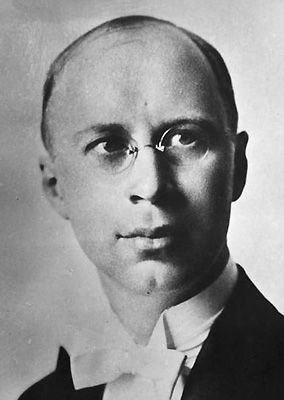
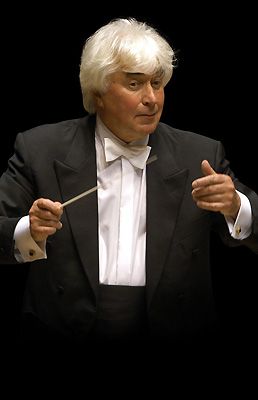
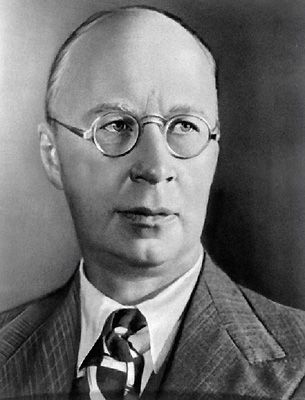
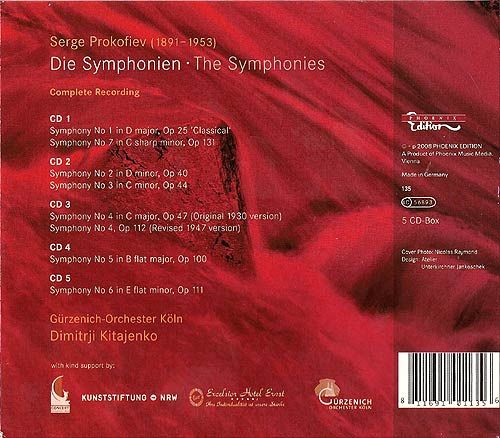
Source: Phoenix Edition CDs (my rip!)
Format: mp3, 320k/s (CBR), DDD Stereo
File Size: 610 MB
Download Link (re-up) - https://mega.co.nz/#!JZ4HDDSY!Rd1i-DlE788NnlLM0yas5hDQbpxA_AurJwd-BOWkFx0
Please don't ask for lossless!
Sharing a note of "Thanks" might get you more stuff! ;)
twentieth century figure’s music. It is a superb musical and technical collaboration,
and one which I know I shall return to again and again with the deepest pleasure."
A must for the serious film music fan (especially lovers of good, pre-Zimmer-era film music!).
Not only was Sergei Prokofiev an outstanding film composer himself (Alexander Nevsky, Ivan the Terrible). His symphonic
oeuvre and his ballets have provided ample "inspiration" to other composers, notably the Hollywood ones, for the past
four decades. Fans of John Williams e.g. should focus on Symphonies Nos. 5 (final movement!) and 6 in particular. ;)
Dmitri Kita(j)enko made a superb, award-winning Shostakovich cycle with the Cologne-based G�rzenich-Orchestra
(the orchestra of the Cologne Municipal Opera) in the mid-2000s, and this complete cycle of Prokofiev symphonies, including
both versions of the 4th Symphony, is similarly successful. Don't miss out on this great music!
Enjoy! Don't share! Buy the original! :)

Music Composed by Sergei Prokofiev
Played by the G�rzenich-Orchester Cologne Philharmonic
Conducted by Dmitri Kita(j)enko
"Until Gergiev’s set of live performances with the LSO appeared, the Prokofiev symphonies as a series had been
nowhere near as well represented on disc as, say, those of Shostakovich or Sibelius. Now we have another
fine set, by an equally distinguished Russian conductor, Dimitrij Kitajenko. Perhaps the most interesting thing
about these performances is how different they are from Gergiev’s. Those readings are passionate, intense
and angst-laden where appropriate; there is no shortage of those qualities in Kitajenko, but his readings are,
on the whole, more measured, slightly more objective. Thus though the temperature may sometimes be a
degree or two lower than in Gergiev, there can be a stronger sense of the architecture of individual works.
The recordings, too, generally allow details of scoring to register with even greater clarity.
Annoyingly, there is a lack of precise information about recording circumstances; the third, fifth and sixth
are takes of live concerts in the Philharmonie Cologne, but the exact dates and venues of the other
performances are not given. The consistent overall balance and quality of sound, however, make it probable
that all were made in the Philharmonie. The G�rzenich Orchestra of Cologne has a proud and distinguished
pedigree which can be traced back as far as the 15th century. On the evidence of these discs alone, it is
a very fine outfit today. Individual parts are always played with character and the right degree of
expressivity, while the general ensemble in these sometimes frighteningly demanding scores is always
tight and controlled.
So a wonderful opportunity presents itself to update one’s evaluation of Prokofiev as a symphonist. The
1st, 5th and 6th symphonies have a secure place in the repertoire; but the 2nd, 3rd and 4th are much
rarer – indeed they are still virtually unknown to the average music-lover, which is extraordinary considering
the eminence of their composer. I confess that I was bowled over by the power of Prokofiev’s imagination
and of his creative personality as revealed by Kitajenko and his players. The 3rd Symphony in particular –
composed in 1928, and based on music from the opera The Fiery Angel – is a truly stunning work which
deserves far more frequent hearings.
The first disc, or ‘volume’, contains the 1st and 7th symphonies. A coupling of some sort is necessary as
the “Classical” is a mere 14 minutes or so, and placing it side by side with the 7th makes a lot of sense.
After that, the symphonies run in sequence, with the two versions of the 4th – the original of 1930 and
the revised version of 1947 – side by side on Volume 3. At present, the five discs are not available
separately, but it is to be hoped that eventually they will become so.
Kitajenko’s Classical Symphony makes a sparkling aperitif to the whole set. One general point to be noted
early on is that his tempi tend to be on the slow side of what we often hear; this is no bad thing, meaning
for example that the finale of the Classical fizzes delightfully without pushing the players too close to the
edge of the possible (as happens in Gergiev’s reading). I did wonder at the beginning of the Larghetto if
this was too much of a good thing, for the music seemed to ‘plod’. I soon got over that, and fell in with the
conductor’s relaxed approach, relishing the utter precision of the high violins and the subtle pointing of
accents in woodwind and horns. The Gavotte, too, is beautifully done, with a throw-away ending that
leaves you straining to hear the last two notes – don’t worry, though, they are there!
The 7th, continuing on the same disc, is naturally quite a different kettle of fish. Written at the very end of
the composer’s life, it is a strange work; it has none of the aggression of his early music, or even of its
immediate predecessor, the 6th . This owing to Prokofiev’s fragile health and to the political trouble he
had got into with the 6th. It has, on the other hand, many of the hallmarks of Prokofiev’s mature style –
great, broad melodies, brilliant orchestration, wit and fantasy. Indeed the first movement’s second theme
is one of the composer’s most magnificent, ranging through more than two octaves in just a few bars.
Yet when this heroic statement reappears in the coda of the finale, there is no sense of true symphonic
peroration; it almost seems as if the melody reappears for no better reason than, well, it’s a good one and
Prokofiev thinks we might like to hear it again. OK, I exaggerate, and the quiet conclusion that follows is
admittedly haunting and equivocal, but the symphony doesn’t grapple with great issues as do the others
from the second onwards.
That said, the 7th is full of charming and irresistibly melodious music, which Kitajenko explores with
subtlety and style, though his predilection for slower tempi does disappoint in places – the first movement
needs to get moving in its more agitato passages, and the opening of the Waltz is too drowsy here for my
taste too, though it does wake up later on. This is probably the least convincing of the conductor’s
interpretations, though, in fairness, the work itself is somewhat recalcitrant.
No such reservations with Volume 2, in which we come face to face with the Prokofiev of the 1920s: a
wild, iconoclastic figure, who was struggling both to find his own voice and to give vent to the tensions
he felt within himself. These were his years of self-imposed exile from the Soviet Union, and the music of
this time undoubtedly shows a huge range of influences. The 2nd Symphony of 1925 has a strange two-
movement structure; a lengthy first movement followed by a 25-minute set of variations. The opening
Allegro ben articulato is breathless, panicky, with motoric ostinati which remind one sometimes of the
Rite of Spring, sometimes of Honegger’s Pacific 231 – both works that Prokofiev encountered at this
time in his career. The gently Dorian theme of the second movement comes as a relief – to the nerves
and the ear – after the excesses of the Allegro. The variations are unfailingly inventive, and culminate
in a remarkable final variation, which begins as a bizarre funeral march, with a Mahlerian feel.
The first performance of the Second was a disappointment, not only to musicians and audiences, but
more importantly to the composer himself, who in his contemporary writings is to be found – for the
first and probably only time in his creative life – doubting his own creative talent. He should not have
worried; the first movement, however, does have a feeling of ‘trying too hard’, though fortunately,
in the Variations, the stress is relieved by Prokofiev’s characteristic humour and imagination.
It seems that in the 3rd Symphony Prokofiev truly found his way forward, and this to me was the big
discovery of this set, for it was not a work I had previously thought much of. How wrong I was,
because this is a genuine masterpiece of the highest order. Right from the churning major/minor repetitions
of the opening, we are drawn into an immense symphonic drama, with episodes of widely disparate
character, which are yet held together by powerful creative control. I was struck by an astonishing
passage in the first movement, Moderato, (track 9, 8:25 to 13:00); the main theme, a fine, broad melody
typical of Prokofiev, soars on high, while down below, heavy brass and percussion seem intent on
destroying its supremacy. And indeed, after some massive organ-like chords, the music collapses into a
grotesque military march - more Mahlerian memories - which in turn is succeeded by a moment of intense
poetry, where the piccolo quietly takes up the broad theme. The scoring throughout all of this is miraculously
imaginative and perfectly judged, showing how hard Prokofiev had been working to perfect this part of his
technical armoury. The three remaining movements sustain the first’s high level of inspiration, and the
work draws an interpretation from Kitajenko and his players that is simply masterly.
It was an excellent idea of Phoenix Edition’s to place the two versions of Symphony no.4 – the original of
1930 and the revision of 1947 – side by side on the third disc of this set. It’s going too far to say that
the revised version is a completely different work, yet it is no mere ‘tidying up exercise’, and the divergences
are considerable. The main material of each movement remains the same, but the older Prokofiev seems
to have felt that the work was too perfunctory, not weighty enough. As a result, he expanded introductions
and codas, and, particularly in the first movement, subjected the themes to more detailed development.
The result is, naturally, a longer work, but also a more spacious one, that surely points the way forward
to the 5th and 6th Symphonies. Which version do I prefer? It’s tempting to back Prokofiev’s first thoughts,
but the broader perspectives of the revision give him space for some characteristically magical moments,
such as the breath-taking harmonies at the conclusion of the 3rd movement (track 7, 5:25 to the end).
Disc 4 is occupied entirely by Symphony no.5 in B flat, the best-known and most often performed of these
symphonies, other than the Classical. Now the ‘received’ opinion is that the 5th and 6th are Prokofiev’s
greatest symphonies; it is no disrespect to those works to say that listening to this set has forced me to
challenge that notion. The 5th is a fine work, but is it really any greater than the 3rd, for example, which
seems equally personal and strikingly original? In the end, this question probably doesn’t matter that much,
beyond emphasising once more that a reassessment of Prokofiev the symphonist is long overdue.
Well, I wrote the previous paragraph before listening for a second time to Kitajenko’s 5th – and what a
piece it is! The conductor underlines its epic nature with his steady tempo for the 1st movement, taking
the indication Andante very seriously, and not pressing forward at all – until the more easy-going second
theme is reached (track 1, 2:48). He keeps a firm, disciplined hold on both tempo and structure, and the
result is hugely impressive. In the central development section, with the second subject transformed from
its initial amicable nature into a striding giant, the music builds to a glorious climax, and the recap of the
main theme comes in on the crest of the wave of energy thus generated. This is great music-making,
bracing and satisfying at the same time.
The middle movements fare equally well, being strongly characterised and meticulously balanced in all
details. Again, Kitajenko avoids the trap of taking a headlong tempo for the scherzo, for it is simply
marked Allegro marcato (fast and rhythmically marked), not prestissimo as we often hear. The more
measured speed allows for the accelerator pedal to be pressed to the floor in the concluding pages, to
thrilling effect. The wonderful Adagio achieves both grandeur and a rapt moonlit intimacy in its closing
pages – surely the composer at the peak of his powers. The emotional temperature is turned down at the
start of the finale, until that crazy clarinet theme initiates an eventful and entertaining rondo. But there
is a sting in the tail; listen closely to the final bars, where a distinctly sinister mood overtakes the music,
before the final surge and crash.
That sinister mood is perhaps the starting point for the 6th – for my money Prokofiev’s finest purely
instrumental work, and a strong candidate for that much-coveted (and never to be awarded!) prize,
‘Greatest Twentieth-Century Symphony’. The 5th had been completed in the immediate relief and exhilaration
following the conclusion of World War 2. After some reflection, Prokofiev set about chronicling in his next
symphony the individual human tragedies of that conflict; he said that “each of us has wounds that cannot
be healed. One of us has lost people dear to him; another has lost his health”. The pain keeps breaking
out in the music, and is at times almost unbearable, as at the end of the development of the first movement,
where horns groan and cry out in agony at the violence that has led up to this moment (track 1, 9:55 to
11:10). And the final pay-off comes in the finale; the forced jokiness of the earlier part of the movement
gives way to a scene of devastation and horror before the convulsive ending. Again, Kitajenko, without
exaggerating or sensationalising, is equal to every interpretative challenge of this amazing score.
This set surely takes up a distinguished position in the recordings of this great twentieth century figure’s music.
It is a superb musical and technical collaboration, and one which I know I shall return to again and again
with the deepest pleasure."
Gwyn Parry-Jones, MusicWeb International




Source: Phoenix Edition CDs (my rip!)
Format: mp3, 320k/s (CBR), DDD Stereo
File Size: 610 MB
Download Link (re-up) - https://mega.co.nz/#!JZ4HDDSY!Rd1i-DlE788NnlLM0yas5hDQbpxA_AurJwd-BOWkFx0
Please don't ask for lossless!
Sharing a note of "Thanks" might get you more stuff! ;)
